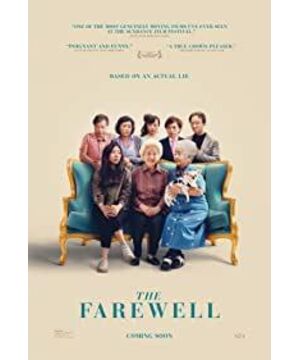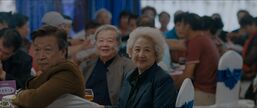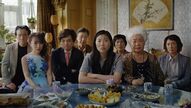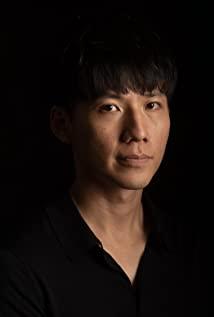The English original title of the movie "Don't Tell Her" is The Farewell, Farewell, or Farewell. Watching an interview with the director, she said that because the Chinese filmmakers felt that names like "farewell" or "farewell" were too sad, the Chinese film title was changed to "Don't Tell Her".
The film does tell a story of "don't tell her": the grandmother in Changchun was diagnosed with advanced lung cancer and had only 3 months to live, but the whole family unanimously decided not to tell her the truth and let the old man pass his last days peacefully. The two sons who were far away in Japan and the United States brought their families back to Changchun, in the name of attending the wedding of the eldest grandson and the Japanese granddaughter-in-law, in fact, to see the old man for the last time.
The whole story is told from the perspective of the granddaughter Billi (Awkwafina) who immigrated to the United States with her parents when she was a few years old. Her prototype is the director of the film, the Chinese American filmmaker Wang Ziyi.
So some people commented that the film is full of American perspectives. This is of course, because the narrator of the story is a young Chinese American who went to the United States with his parents when he was a few years old, and who does not speak Chinese very well.
As a Northeasterner who has been away from home for many years and is overseas, I dare to guarantee the authenticity of the story in the film. My grandmother was also diagnosed with advanced esophageal cancer. Under the concealment of the whole family, she passed the last time of her life peacefully but vaguely aware. I dare not say in other regions, at least in Northeastern families in China, this kind of thing is very common. And because I was in a different place, I missed the funerals of my grandmother and grandfather again and again, as well as the last time of my grandfather. What was waiting for me was that in the morgue of the funeral home after I got off the plane, I saw the lovely old man who accompanied me the most when I was a child, and I no longer knew him.
Waiting for death and saying goodbye to a loved one, this is a very complex emotional overlay that is told just right in the film. Not overly provocative, nor overly indifferent.
So I think it is also applicable to replace the United States in "Don't Tell Her" to Beijing, Shanghai, Guangzhou and Shenzhen, Paris to London, and Sydney to Auckland. The development of the past 40 years has not only made China's economic achievements attract worldwide attention, but also made more and more Chinese families from decades ago, whose ancestors never left a house, a village, or an urban area, have become today. There are trans-regional and transnational Chinese families everywhere: my grandfather is in the Northeast, my father is in Shanghai, and my son is in the United States.
What accompanies the spread of Chinese families and the flow of population is the conflict between this decentralized family structure and the traditional Chinese family culture. The Chinese family structure has changed, from the original cohabitation in the same courtyard to the whole world, but the family culture has not changed, at least the pace of change has not caught up with the speed of family structure change.
Therefore, at the wedding of the eldest grandson in "Don't Tell Her", the eldest son Haibin, who came back from Japan, burst into tears, because he had been in Japan for 25 years as a painter, but the burden of taking care of his mother fell on his cousin's shoulders. The eldest son, my heart is full of infinite guilt. In traditional culture, filial piety comes first. He is the son of unfilial piety. He is the tearer between family structure and family culture.
However, the film opens up another way for us to understand this issue from the perspective of a young American. In Billi's eyes, although her aunt's child, Bao'er, is in Changchun, she still plays games on her mobile phone every day, even in the cemetery. Although she is in the United States, she has the deepest concern and longing for her grandmother.
At the end of the film, Billi, who is on the verge of bankruptcy, has no money, no home, no career, no lover, is standing in the rush of people on the streets of New York. He unconsciously remembers the "breathing method" that his grandmother taught her in Changchun. "Ha", the turbid air is discharged, cheer up and face life.
This ending is the highlight of the whole film.
Although she can't speak Chinese, even at the beginning, she couldn't understand why the whole family didn't tell the truth of her grandmother's illness, and she felt absurd and alienated from everything in Changchun, but in the end, she accepted her grandmother's "qigong" and accepted the Chinese The seemingly unscientific life philosophy of "Mind is the most powerful" has gradually accepted the practice of the whole family concealing grandma's illness, because they shared grandma's fear of death and psychological burden.
At the end of the film, the director broadcasted the real life video of her grandmother. The old man has been diagnosed with advanced lung cancer for 6 years, and he is still alive. He shouted "ha" optimistically in front of the camera, expelling turbid air and keeping healthy. body. "Concealment therapy" is confirmed to be effective, although it is not legal in the United States to conceal a patient's condition.
At the beginning of "Don't Tell Her", we can indeed see the perspective of a young 1.5-generation Chinese American who is very unfamiliar and alienated with domestic life, and feels that everything is absurd: strange family members, bizarre northeast city life, Khrushchev-style concrete buildings, kebabs all over the street, dazzling neon lights, incomprehensible dialogues and habits, endless cultural conflicts and quarrels.
But in the end, we can see understanding, fusion, and even through this absurd journey, to rediscover some of the profound philosophies that exist in her own ethnic culture, inspiring and even saving her current life dilemma. Billi's trip to Changchun when he returned to China to visit his grandmother seemed to be an absurd journey, but it was actually a journey of self-discovery and self-rescue. It was her grandma who had terminal cancer and still had war bullets in her legs who made her feel strong.
From this point of view, the Chinese name of the film was actually changed very well, because Billi did not say goodbye to his grandmother, nor did he say goodbye to China because he immigrated to the United States with his parents. The culture of families and ethnic groups has become more connected and understood, and even inherited unknowingly, and found the strength to face American life directly.
Another great significance of this film is that director Wang Ziyi, through the story of "Don't Tell Her", shows the real life of more and more Chinese trans-regional and transnational families, how they face distance, companionship, family affection, death, bid farewell.
There is a detail in the movie that after my grandfather passed away, my grandmother went to find the "post-wife" Grandpa Li, but after Grandpa Li poured water for grandma's feet, he went back to his room. The two old people looked like "wifes" to outsiders. ”, “partners”, but they sleep in separate rooms and separate beds. Grandma even complained on the phone with her granddaughter Billi that Grandpa Li "can't understand anything" and "just a companion".
That is to say, when the eldest son Haibin was still deeply remorseful and guilty for not accompanying his mother by his side, the old man himself was already indifferent, and he had already divided the companionship of life and the psychological sustenance into two, and divided the companionship of life into two parts. It was given to Grandpa Li, who was hunched over his ears, but he shared his inner sustenance with his granddaughter Billi, who was far away on the other end of the phone in the United States.
There is no such thing as a banquet in the world, and there will be differences between relatives after a hundred years. Perhaps the best way to part is to commemorate in our hearts, and like Billi learned the "spiritual victory method" from his grandmother, let our relatives become the source of strength in our hearts to brave the world and face life.
View more about The Farewell reviews











